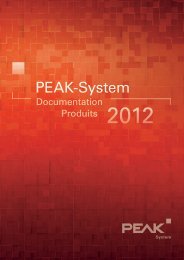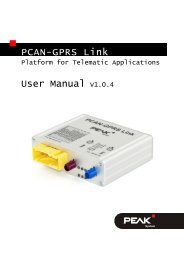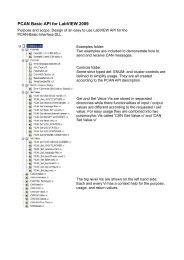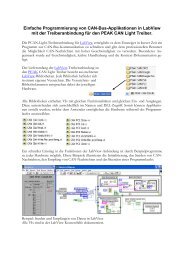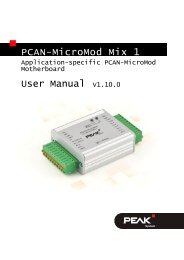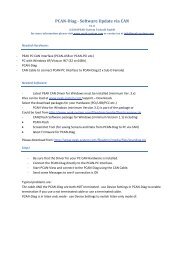1 PLIN-API Documentation - PEAK-System
1 PLIN-API Documentation - PEAK-System
1 PLIN-API Documentation - PEAK-System
You also want an ePaper? Increase the reach of your titles
YUMPU automatically turns print PDFs into web optimized ePapers that Google loves.
3.5 The LIN Receive Message <strong>PLIN</strong> <strong>API</strong> <strong>Documentation</strong><br />
3.5 The LIN Receive Message<br />
The messages that a hardware sends and/or receives can be read from each connected client . The <strong>PLIN</strong> system forwards a<br />
received message to the receive queue of each connected client, if the filter of the client accepts the message. An user can<br />
read the messages from the receive queue of a client using the function LIN_Read ( see page 114) (.NET: Read ( see<br />
page 61)) or using LIN_ReadMulti ( see page 114) (.NET: ReadMulti ( see page 62)).<br />
The interpretation of a received message is the same for both a Master and a Slave. In slave-mode, an external Master is<br />
responsible for sending the Frame-Header. In master-mode, the hardware itself is responsible for sending the Header.<br />
A Receive Message contains the following elements:<br />
Type<br />
Represents the type of a received Message. The Type is defined as TLINMsgType ( see page 39) and can be one of the<br />
following values:<br />
• mstStandard: A message with data.<br />
• mstBusSleep: A message meaning that the bus state has changed to Bus-Sleep ( The bus is recesive for at least 4<br />
seconds). Only the Timestamp and Hardware Handle within this message is valid.<br />
• mstBusWakeUp: A message meaning that a Wake-Up Impulse was received while the hardware was in Sleep state (data<br />
byte F0h). Only the Timestamp and Hardware Handle within this message is valid.<br />
• mstAutobaudrateTimeOut: A message meaning that a Baud-Rate Recognition process started before, got a timeout and<br />
was unsuccessful. Only the Timestamp and Hardware Handle within this message is valid.<br />
• mstAutobaudrateReply: A message that is a response to a Baud-rate Recognition process started before. The Timestamp<br />
of this message is valid. The data bytes 0 (lsb) to 3 (msb) contain information about the duration of 8 data bits in<br />
microseconds (the Sync Byte is measured).<br />
• mstOverrun: A message indicating that the receive buffer of the hardware has been read out too late. The Timestamp of<br />
this message is valid. The data bytes 0 (lsb) to 1 (msb) contain the current count of overrun errors.<br />
• mstQueueOverrun: A message indicating that USB data packages are being lost or the sequence of those packages has<br />
changed. The Timestamp of this message is valid. The data bytes 0 (lsb) to 1 (msb) contain the current count of<br />
queue-overrun errors.<br />
Frame Id<br />
Valid only for messages of type mstStandard. Represents the ID of the received frame with parity bits.<br />
Length<br />
Represents the length of the data bytes contained within the received message. The length can be a value between 0 and 8.<br />
Direction<br />
Valid only for messages of type mstStandard. Represents the direction of a received Message. The Direction of the<br />
message shows how the message must be interpreted.The Type is defined as TLINDirection ( see page 41) and can be<br />
one of the following values:<br />
• dirPublisher: A received message is a publisher message. See Message as Publisher ( see page 15).<br />
• dirSubscriber: A received message is a subscriber message. See Message as Subscriber ( see page 17).<br />
• dirSubscriberAutoLength: A received message is a subscriber message with automatic length. See Message as<br />
Subscriber-AutoLength ( see page 18).<br />
Checksum Type<br />
Valid only for messages of type mstStandard. Gives information about the type of checksum expected within the message.<br />
The checksum type is defined as TLINChecksumType ( see page 42) and the possible values are:<br />
14<br />
3



![English - Low Quality [7.2 MB] - PEAK-System](https://img.yumpu.com/5931738/1/184x260/english-low-quality-72-mb-peak-system.jpg?quality=85)
